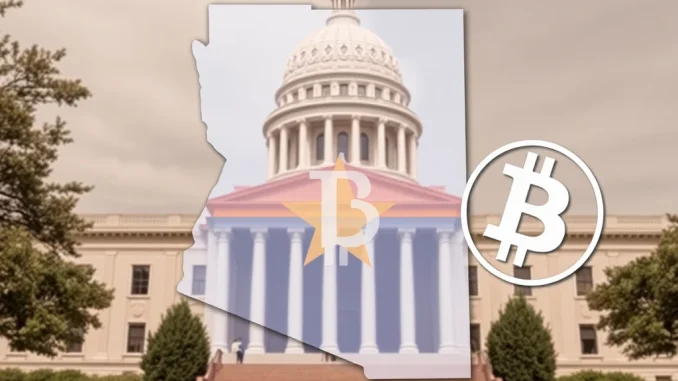
Arizona is making significant moves in the world of digital assets. Recent legislative action signals a growing interest within the Arizona government to explore and utilize cryptocurrencies, particularly Bitcoin. This development is a notable step for a U.S. state government considering direct involvement in the crypto space.
Arizona Bitcoin Bills Make Headway
The Arizona House of Representatives has given its approval to two distinct Arizona Bitcoin bills: SB1373 and SB1025. These bills represent different facets of how the state could engage with digital assets.
- SB1373: Passed the House with 37 votes in favor and 19 against.
- SB1025: Passed the House with 31 votes in favor and 25 against.
Both bills now await potential signing into law by Arizona Governor Katie Hobbs, opening a new chapter for state-level crypto adoption.
Establishing a Bitcoin Strategic Reserve
One of the key pieces of legislation, SB1373, focuses on creating a dedicated fund. This bill proposes the establishment of a Bitcoin strategic reserve fund. The management of this reserve would fall under the purview of the state treasurer’s office.
What would power this reserve? The fund is designed to include:
- Funds specifically appropriated by the state legislature for this purpose.
- Confiscated cryptocurrencies. This is a particularly interesting point, suggesting a mechanism for the state to integrate assets seized through legal processes into its financial holdings.
The concept of a strategic reserve is often associated with critical assets like oil or precious metals, intended for use during economic uncertainty or specific state needs. Applying this model to Bitcoin highlights a view of the cryptocurrency as a potentially valuable, long-term asset.
Enabling State Crypto Investment
Complementing the strategic reserve concept, SB1025 addresses broader state fund investment. This bill would grant permission for state public funds to allocate a portion of their assets into cryptocurrencies. Specifically, it would allow these funds to invest up to 10% of the funds they control in digital assets. This is a significant potential allocation, suggesting a belief in the potential returns or diversification benefits that Arizona crypto holdings could provide.
This move could potentially impact various state-managed funds, from pension funds to general investment pools, introducing them to the volatility and potential growth of the crypto market.
What Does State Crypto Investment Mean?
The passage of these bills by the Arizona House sparks discussion about the role of state governments in the digital asset space. What are the potential implications of state crypto investment?
Potential Benefits:
- Diversification: Adding a non-correlated asset like Bitcoin could potentially diversify state portfolios.
- Inflation Hedge: Some proponents view Bitcoin as a potential hedge against inflation, preserving purchasing power over time.
- Potential Growth: Cryptocurrencies, while volatile, offer the potential for significant long-term growth.
- Innovation Leadership: Taking steps like these could position Arizona as a forward-thinking state in adopting new financial technologies.
Potential Challenges:
- Volatility: The price of cryptocurrencies is notoriously volatile, which could impact the value of state funds.
- Security: Storing and managing digital assets securely requires specialized expertise and infrastructure.
- Regulatory Uncertainty: The regulatory landscape for cryptocurrencies in the U.S. is still evolving, which could pose risks.
- Political Risk: Investing public funds in a controversial asset class like crypto could face political opposition and public scrutiny.
The Road Ahead for Arizona
With both Arizona Bitcoin bills now having cleared the House, the focus shifts to Governor Katie Hobbs. Her decision will determine whether these concepts of a state Bitcoin strategic reserve and direct Arizona crypto investment become law. This legislative progress in Arizona highlights a growing trend of states exploring how digital assets fit into traditional financial and governmental structures. The outcome in Arizona could potentially influence other states considering similar steps towards state crypto investment.
Summary
Arizona’s House of Representatives has taken a notable step by passing bills SB1373 and SB1025, proposing a Bitcoin strategic reserve and allowing state public funds to invest up to 10% in cryptocurrencies. These actions by the Arizona government demonstrate a willingness to explore the potential of digital assets for state finances. As these Arizona Bitcoin bills head to the governor’s desk, the nation watches to see if Arizona will become a pioneer in direct state crypto investment and asset management.



